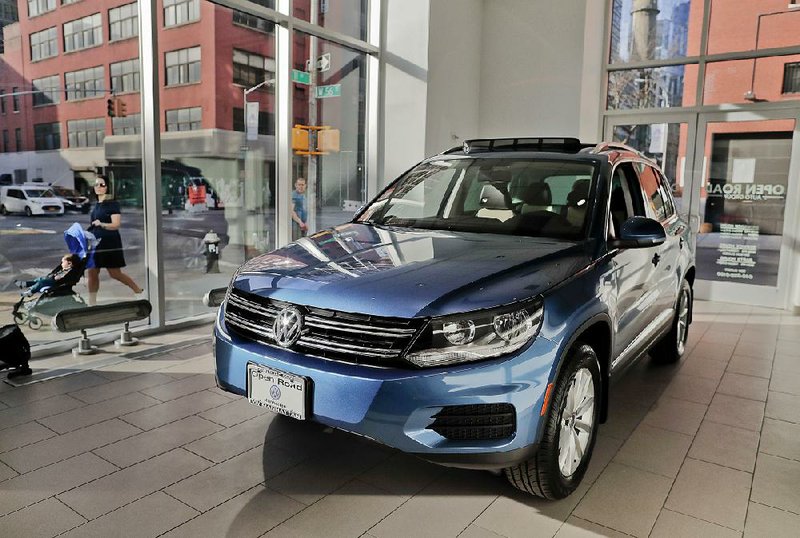NEW YORK -- Volkswagen of America's chief executive said Thursday that he's confident the brand's sales will recover from a diesel emissions cheating scandal as it rolls out new SUVs for the U.S.
Hinrich Woebcken estimates that Volkswagen sales rose 10 percent in the first quarter when the rest of the U.S. market was down nearly 2 percent. And that's without new Volkwagen sport utility vehicles on sale yet.
At the New York auto show, which begins today, Woebcken announced that Volkswagen will build a smaller five-passenger SUV off the underpinnings of its Atlas seven-passenger vehicle. He wouldn't say when it will come out or whether it will increase jobs at Volkswagen's U.S. factory in Chattanooga, Tenn.
With the new SUV, Volkswagen will have five for sale in the U.S. The Atlas is due out in a few weeks.
Volkswagen plans to present a fully electric concept crossover vehicle in Shanghai next week to challenge Tesla's Model X as the German manufacturer gears up to roll out a new zero-emission line-up as of 2020.
Like the hatchback and van concepts Volkswagen has shown in recent months, the third vehicle of the planned I.D. electric-car line offers a battery-powered range comparable to models with combustion engines and can drive autonomously, the Wolfsburg, Germany-based automaker said Wednesday in a statement.
"Volkswagen has set the clearly defined goal of advancing electric-drive vehicles from the status of a startup niche to large-scale production models by the middle of the next decade in a worldwide product offensive," the company said in a news release.
The brand's target to sell 1 million electric cars a year by 2025 is a cornerstone of a revamp amid an industry shift to emission-free vehicles prompted by tightening regulations.
Volkswagen, which dethroned Toyota Motor Corp. as the world's best-selling automaker last year, is balancing the huge expenses of developing battery-powered vehicles and new digital features with the financial fallout of its diesel-emissions cheating scandal.
The automaker is making progress settling U.S. legal claims from its emissions cheating scandal, but the company continues to struggle with the collection of hundreds of thousands of diesel cars it is being forced to buy back.
Volkswagen agreed last year to buy back about 500,000 diesels that it rigged to pass U.S. emissions tests if it can't figure out a way to fix them. Except for a handful of 2015 models, dealers can't sell the cars until -- and unless -- the company comes up with repairs to satisfy regulators.
In the meantime, the company is hauling them to storage lots, such as ones at an abandoned NFL stadium outside Detroit, the Port of Baltimore and a decommissioned U.S. Air Force base in California.
"This could get drawn out for a long time," said Dave Sullivan, an analyst with industry consulting firm AutoPacific. "The question is how long will it take for VW to say 'I give up?'"
The buyback -- a costly logistical headache -- is part of the penalty for Volkswagen's years-long scheme to circumvent U.S. emissions regulations. The automaker sold diesel vehicles with software that activated stronger emissions controls during government lab tests but were inactive in regular driving, when nitrogen-oxide emissions surged to as much as 40 percent above legal limits.
Six Volkswagen executives have been indicted and the company has set aside nearly $24 billion to cover cheating-related costs, including more than $10 billion to buy back vehicles in the United States. A second buyback of around 20,000 3.0-liter diesel cars is expected to start in the coming months.
About 15,000 Volkswagen owners are showing up at dealerships each week now to sell their Jettas, Golfs, Passats, Beetles and Audi A3s to the carmaker in exchange for payments of as much as $40,000. The agreement dictates that the cars can't be put back on the road without being brought into environmental compliance, something that is almost certainly impractical for most of them. Even exporting them to countries with lesser emissions standards is forbidden.
In all, around 288,000 owners or lessees had opted for a buyback or early lease termination as of Feb. 18, of which 138,000 had been completed, according to the latest update filed with a court overseeing the settlement. Another 52,000 owners have said they want to keep their cars and are awaiting a fix.
Information for this article was contributed by The Associated Press and Ryan Beene and Christophe Rauwald of Bloomberg News.
Business on 04/14/2017

